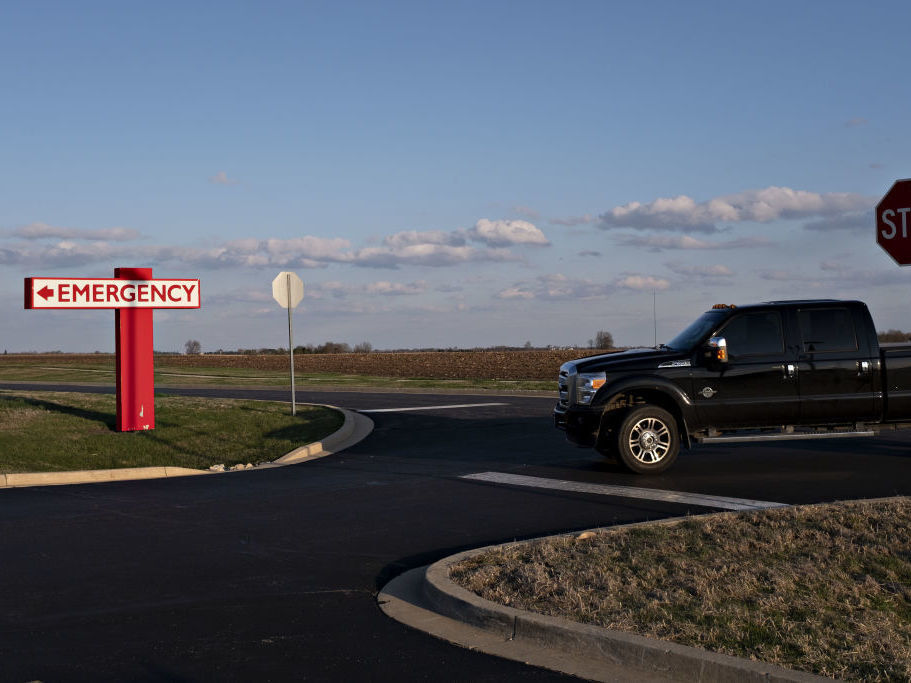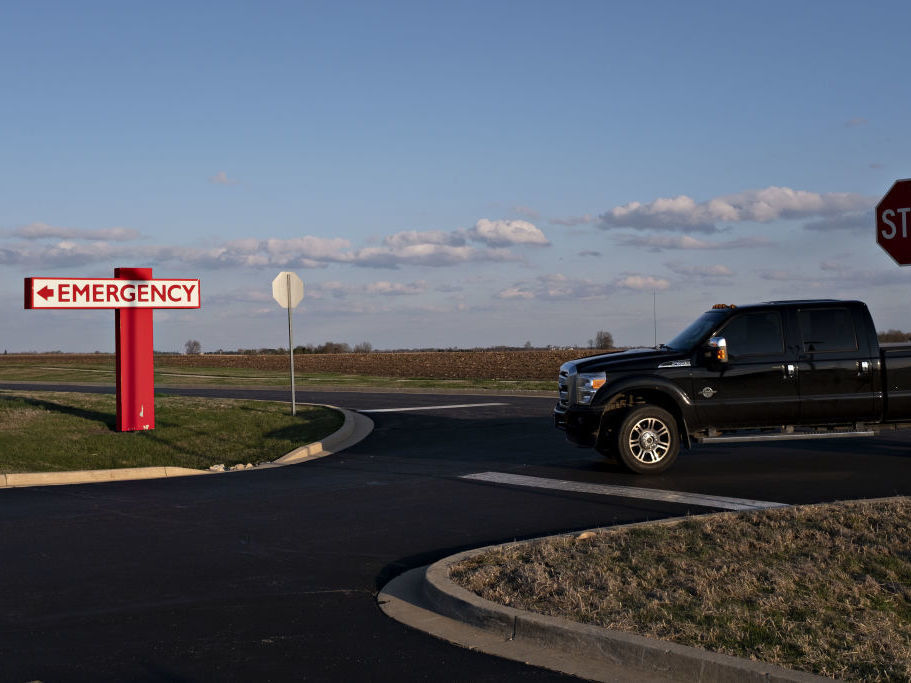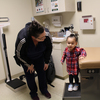
Extra than 65{a408158a2c6651201571b5f3f92422d172f1fb5dd4f351e7477296117ae1cd60} of the nation’s tiny, rural hospitals took out financial loans from Medicare when the pandemic strike. Numerous now facial area compensation at a time when they are less than good economic strain.
Daniel Acker/Bloomberg by using Getty Photographs
conceal caption
toggle caption
Daniel Acker/Bloomberg by way of Getty Visuals

Additional than 65{a408158a2c6651201571b5f3f92422d172f1fb5dd4f351e7477296117ae1cd60} of the nation’s tiny, rural hospitals took out loans from Medicare when the pandemic hit. Numerous now confront reimbursement at a time when they are under good fiscal pressure.
Daniel Acker/Bloomberg by means of Getty Visuals
David Usher, main fiscal officer for a 12-bed rural medical center in western Kansas, is sitting on $1.7 million he is frightened to invest.
The funds lent from the federal federal government is meant to enable hospitals and other health treatment providers weather conditions the COVID-19 pandemic. Nevertheless some medical center directors have referred to as it a payday bank loan software that is now brutally thanks for repayment at a time when the establishments nonetheless have to have assistance.
Coronavirus scenarios have “picked up not long ago and it truly is very stressing,” says Usher, who is the main monetary officer for Edwards County Clinical Center in Kinsley, Kan. He would like to use the federal loan cash to construct a unfavorable-pressure area these rooms are a typical and helpful instrument for maintaining contagious sufferers aside from individuals in the relaxation of the healthcare facility.


But he is not sure it is really protected to shell out that income. Officially, the whole compensation of the personal loan is because of this thirty day period. Or else, in accordance to the loan’s terms, federal regulators will stop reimbursing the hospitals for Medicare patients’ treatments until finally the mortgage is repaid in full.
When will the creditor come contacting?
The federal Facilities for Medicare & Medicaid Services has not nonetheless begun attempting to recoup its expense, with the coronavirus nevertheless affecting communities nationwide, but hospital leaders dread it may perhaps occur calling for repayment any day now.
Hospital leaders throughout the country say there has been no communication from CMS on no matter if or when it will alter the compensation deadline. A CMS spokesperson did not respond to our queries by publishing time.
“It can be terrific possessing the dollars,” Usher says. “But if I you should not know how a great deal I get to preserve, I do not get to expend the funds wisely and correctly on the facility.”
Usher took out the financial loan from Medicare’s Accelerated and Advance Payments application. The application, which existed extended prior to the pandemic, was usually employed sparingly by hospitals when they ended up faced with emergencies this sort of as hurricanes or tornadoes. It was expanded for use in the course of the coronavirus pandemic — section of billions accepted in federal aid cash for health and fitness treatment providers this spring.
A entire reimbursement of a hospital’s mortgage is technically because of 120 times after it was obtained. If it is not paid out, Medicare will end reimbursing claims until finally it recoups the cash it is owed — a place spelled out in the program’s procedures. Medicare reimburses nearly $60 billion in payments to well being care providers nationwide under Medicare’s Section A plan, which can make payments to hospitals.

Much more than 65{a408158a2c6651201571b5f3f92422d172f1fb5dd4f351e7477296117ae1cd60} of the nation’s compact, rural hospitals — quite a few of which had been running at a deficit right before the pandemic — jumped at the Medicare financial loans when the pandemic strike since they were the initially money readily available, states Maggie Elehwany, former vice president of govt affairs for the Nationwide Rural Overall health Affiliation.
CMS halted new bank loan programs to the program at the conclusion of April.
“The pandemic has just gone on for a longer period than everyone predicted again in March,” claims Joanna Hiatt Kim, vice president of payment plan and analysis for the American Medical center Affiliation. The trade affiliation sent a letter to CMS in late July inquiring for a delay in the recoupment.
On Monday, the Household Appropriations Committee involved partial reduction for all hospitals in a new authorities funding system. The committee’s proposal would prolong the commence of the repayment period of time for hospitals and the amount of money of time they are permitted to acquire to repay.
The continuing resolution that involves this language about aid for hospitals (between a lot of, numerous other matters) is continue to remaining hammered out, though it does facial area its personal deadline: It will have to be authorised by the Dwelling and the Senate inside the up coming 9 days or the federal govt faces a shutdown.
“Still in the middle of this disaster”
Tom Nickels, government vice president at the AHA, says his business appreciates the House committee’s effort and hard work to tackle the financial loans in the new monthly bill, but whole forgiveness of the financial loans is still needed.
Sen. Jeanne Shaheen, D-N.H., has termed for improvements to the loan repayment period for months and reported Monday “our function is considerably from above.”

“We are nonetheless in the center of this disaster — from both health and fitness and economic standpoints,” Shaheen claims.
Meanwhile, medical center directors like Peter Wright are holding their breath, waiting around to see if, in order to settle the credit card debt, Medicare will stop making payments to hospitals, even as the amenities continue to grapple with the coronavirus in their communities.
“The feds, if you owe them funds, they just take it,” claims Wright, who oversees two compact hospitals for Central Maine Healthcare in Bridgton, Maine. He claims his health treatment method took the revenue mainly because “we experienced no other option it was a money flow situation.”
For many hospitals, Medicare payments make up 40{a408158a2c6651201571b5f3f92422d172f1fb5dd4f351e7477296117ae1cd60} or extra of their revenue. Not being reimbursed by Medicare would be crippling — akin to a house shedding just about 50 percent its profits.
“We have no plan what we are likely to do if we have to shell out it back again as quickly as they say,” Wright says.
In rural Kentucky, clinic government Sheila Currans states she “vacillated” for about a 7 days or so, making an attempt to come to a decision no matter whether to faucet the financial loan plan for her clinic — she knew it would have to be repaid and worried that could establish tough.
“It was a desperate time,” claims Currans, main government of Harrison Memorial Hospital in Cynthiana, Ky. In early March her hospital was the to start with in the state to deal with a COVID-19 patient, she claims.
The medical center instantly quarantined dozens of personnel users at the time and shut down elective methods. When COVID-19 was confirmed in the community, there was a “awful anxiety” among the citizens of acquiring infected, Currans suggests, and that saved men and women from trying to get outpatient treatment as well.
“Via March and April and most of May, I was in a comprehensive spiral,” Currans states, and by the finish of April her hospital was getting rid of hundreds of thousands of dollars. To cope with the pandemic, she furloughed workers and turned a person wing of the hospital into a “cough clinic” to be employed solely by people whose symptoms recommended they may well be infected with the coronavirus.
Currans says the medical center is even now viewing instances of COVID-19 exhibit up, but other clients are starting to return for companies, far too, this sort of as at the outpatient clinics.
In conditions of the hospital’s finances, “it’s continue to not a fantastic time,” Currans suggests, incorporating that the Medicare bank loan and other aid from the federal governing administration “assisted us — at minimum for now — endure it.”
She’s hoping the reimbursement demand from customers will be pushed again to 2021 or, maybe, the financial loan will be forgiven.
“I know it’s a pipe dream,” Currans says. “But this has been a historic occasion.”
Kaiser Overall health Information is a nonprofit, impartial system of the Kaiser Family Basis, and is not affiliated with Kaiser Permanente.
Sarah Jane Tribble expended additional than a 12 months and a 50 percent reporting on a Kansas city that dropped its only healthcare facility. This month, KHN and St. Louis Public Radio will start “Exactly where It Hurts,” a podcast checking out the typically unpleasant cracks developing in America’s wellbeing program. You can pay attention to Episode 1 of the podcast’s initial year, “No Mercy,” on Sept. 29.






More Stories
Stair Running Workout! Boost Testosterone – Build Muscle!
Is That Beer Belly Causing Your Back Pain? The Truth May Shock You
Permanent Cure For Back Pain